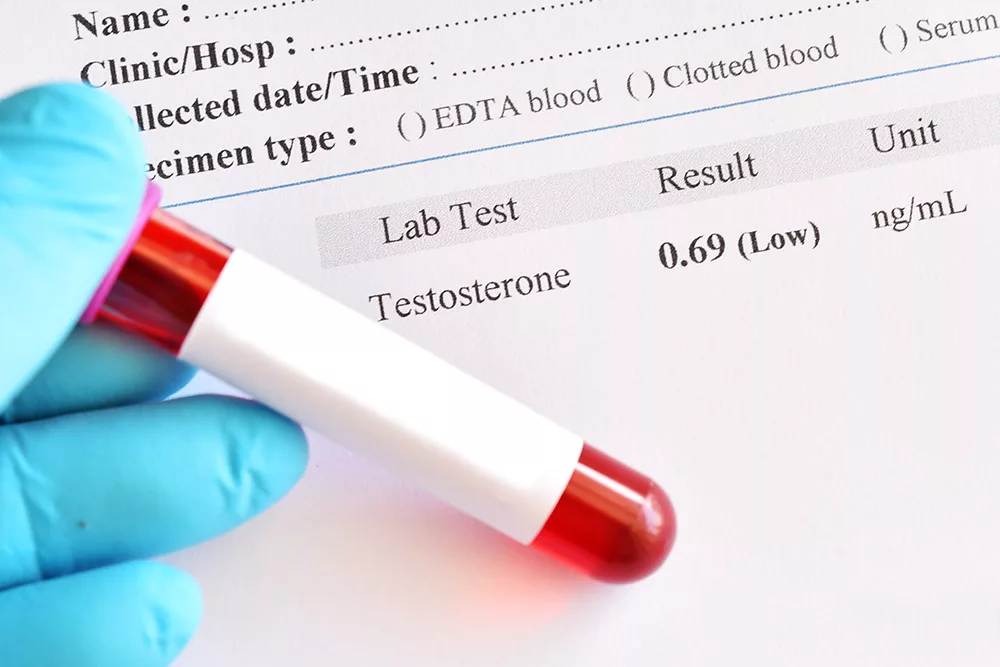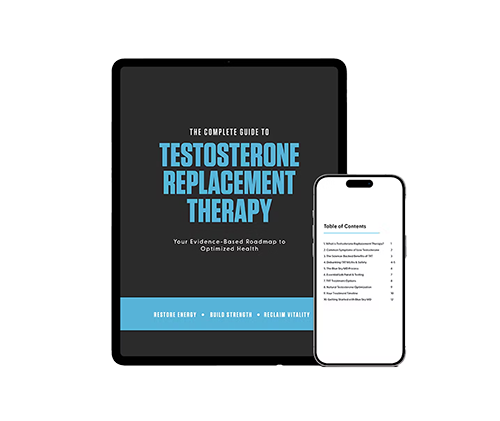Hormones are quickly becoming an important topic in the field of medicine because of its efficacy in treating a long list of age-related symptoms, from erectile dysfunction, muscle loss, and loss of bone density.
However, hormone replacement therapy (HRT) is a controversial topic to some due to the nature of hormones and their complex roles in the human body. As a result myths and misconceptions about HRT are quite common.
But before we dive into a few common myths and misconceptions, let’s make sure we’re all on the same page and briefly discuss what hormone replacement therapy for men is.
What is Hormone Replacement Therapy?
Hormone replacement therapy for men, also known as testosterone replacement therapy, is a medical treatment that involves the use of male sex hormones, primarily testosterone, to address hormonal imbalances or deficiencies in men.
This therapy is typically prescribed to men who either have low testosterone levels due to aging or underlying health conditions, or have undergone surgery or medical treatments that have affected their hormone levels.
The treatment involves the administration of testosterone through injections, gels, patches, or implants to balance the hormone levels and improve symptoms like fatigue, low sex drive, muscle weakness, and decreased bone density.
However, hormone replacement therapy for men may also have some potential risks and side effects, such as acne, sleep apnea, prostate problems, and increased risk of cardiovascular disease in some cases. Therefore, it is essential to schedule a consultation discuss the potential benefits and risks of hormone replacement therapy with a qualified healthcare professional before undergoing this treatment.
Myth #1: Hormone Replacement Therapy (HRT) and Testosterone Replacement Therapy (TRT) are the same thing
Fact: TRT is a form of HRT, but not all HRT involves testosterone replacement therapy.
While TRT (Testosterone Replacement Therapy)is a type of HRT (Hormone Replacement Therapy), not all HRT is TRT, and they should not be confused as the same thing, although they are often used interchangeably.
TRT is a specific type of HRT that is used to treat low levels of testosterone in men. It involves the use of bioidentical testosterone to replace the natural hormone that is missing or deficient.
HRT, on the other hand, can refer to a broader range of therapies used to replace or supplement hormones that are deficient or imbalanced in both men and women.
HRT can include treatments for menopause, thyroid hormone replacement, and treatment for pituitary gland disorders.
Myth #2: Hormone Replacement Therapy (HRT) or Testosterone Replacement Therapy (TRT) will make me angry or more aggressive.
Fact: Hormone Replacement Therapy helps reduce patients’ feelings of anxiety, depression, and improves mood.
There is still much debate among researchers and medical professionals regarding the effects of testosterone replacement therapy (TRT) on aggression in men. Some studies have suggested that TRT may increase aggression in some men, but the evidence is not consistent.
Men who are seeking TRT may already experience symptoms of irritability or anxiety, which could also contribute to increased aggression.
Hormone imbalances and low testosterone levels often makes men feel lethargic, sluggish, or simply “not like their old self”. These physical symptoms can cause stress, anxiety, or depression that can increase irritability and frustration.
Through HRT, we tackling the root cause of the hormone imbalance can restore youthful confidence and energy and treat the psychological symptoms, improving overall mood.
Many of our patients report feeling happier and more relaxed as a result.
It is also important to consider that appropriate dosing and monitoring of TRT is crucial to avoiding any potential negative side effects. Patients are monitored carefully and dosages adjusted when necessary during treatment at Blue Sky MD to ensure negative symptoms like irritability or aggression don’t develop as a result of TRT.

Myth #3: Only older men need TRT.
Fact: Men ages 30 & up can benefit from testosterone replacement therapy.
Hormone imbalances can affect men of all ages. Most men start experiencing a decline in testosterone production around 40, and a 1-3% drop each year after that point is common.
However, some men begin experiencing a noticeable decrease in testosterone as early as their late 20s and early 30s.
Testosterone levels have been declining in men across the world for decades.
Why are average testosterone levels decreasing? Unfortunately, there’s no simple explanation and it’s more than likely a combination of factors.
For one, obesity caused by sedentary lifestyles and poor diet are becoming more and more common. Obesity has been linked to reduced testosterone levels and affect a number of different hormonal systems in our body.
Another possible explanation is the increased levels of toxins in our food and our environment. Everything from pesticides to plastics could be slowly but surely interrupting our body’s natural testosterone production.
Bio-identical hormone replacement therapy can help restore testosterone to your own personal “normal” range, improving strength, energy, and overall well-being.
North Carolina’s #1 TRT CLINIC
Since 2008, we’ve been at the forefront of TRT in North Carolina. Learn more about our life-changing testosterone therapy program for men.

Myth #4: HRT increases the risk of heart problems.
Fact: According to recent studies, TRT can improve cardiovascular health in men.
There is no conclusive evidence that TRT or HRT increases the chances of heart issues. In fact, a recent study of 83,00 veterans found that men who received hormone replacement therapy had a lower risk of heart attack, stroke, or death from any cause.
Additionally, an increased desire and ability to exercise as a result of optimized testosterone levels may provide additional heart-healthy benefits for men.
Men and women with pre-existing heart conditions may not be good candidates for HRT, however. As with any medical treatments, you’ll need to consult with your primary care physician before undergoing any hormone replacement therapy and you will be thoroughly screened by your HRT provider before beginning any treatment.
Myth #5: My primary care provider can provide me with testosterone replacement therapy.
Fact: Hormone clinics are better suited to provide optimal outcomes when it comes to testosterone replacement therapy.
Hormone clinics like Blue Sky MD have a full staff of medical professionals who have received specialized training in hormone therapy.
On the other hand, primary care physicians are trained to manage a wide range of medical conditions, and may not have the same level of expertise when it comes to hormones specifically.
Additionally, primary care physicians may not have access to the same range of diagnostic tests or specialized treatment options that are available in hormone clinics.
Blue Sky MD operates its own lab for blood panels allowing us to measure hormone levels efficiently and accurately.
A hormone clinic like Blue Sky MD will typically offer a more individualized approach to TRT, with tailored treatment plans that take into account a patient’s unique needs, goals, and medical history. This can lead to better outcomes and an improved quality of life for patients receiving TRT.
Myth #6: Hormones are genetic and lifestyle does not affect hormone levels.
Fact: According to recent studies, TRT can improve cardiovascular health in men.
Lifestyle plays a crucial role in hormone regulation, particularly testosterone.
The Western diet, high in processed foods, added sugar, and refined carbohydrates, can increase insulin resistance which can lower testosterone levels. Men who are overweight or obese have higher levels of estrogen, which can further reduce testosterone levels. Conversely, a diet focusing on whole, nutrient-dense foods, such as fruits, vegetables, and lean proteins, can support healthy testosterone levels.
Excessive amounts of alcohol, tobacco, and drugs can also negatively impact testosterone production.
Exercise is also vital in maintaining proper testosterone levels. Resistance training, such as weightlifting, has been shown to increase testosterone production significantly. Exercise also promotes weight loss, reduces stress and inflammation, and can improve insulin sensitivity.
Lastly, adequate sleep and stress management are crucial in maintaining healthy hormone levels. Sleep deprivation and chronic stress can increase cortisol, a hormone that can contribute to reduced testosterone levels. Prioritizing quality sleep and stress reduction techniques, such as mindful meditation or yoga, can have a positive impact on hormone regulation.

Myth #7: If I have low testosterone, there’s nothing I can do to increase it.
Fact: TRT can improve your energy, libido, and metabolism, helping you feel better, lose weight, and regain youthful confidence.
Get the help you need and start feeling like yourself again with hormone replacement therapy for men.
If you suffering from constant fatigue, low libido, sudden weight gain or muscle loss, these could be symptoms of a hormone imbalance. The best thing to do is to get your hormone levels analyzed by a lab. Blue Sky MD can help you get a clear understanding of your hormone makeup.
Schedule an appointment with us today to get started with your lab blood panels and let’s get to the root of your symptoms.

Dr. David LaMond, MD
Medical Director
Dr. David LaMond is the founder and Medical Director of Blue Sky MD. He has been a the forefront of hormone therapy and weight loss since 2008. Drawing from his foundation and board certification in Family Medicine, he has created the core medical principles behind the Blue Sky MD concept of total patient care. He is an active member of the American Society of Bariatric Physicians, American Society of Laser Medicine and Surgery and American Academy of Family Physicians.
HRT FOR MEN: FREQUENTLY ASKED QUESTIONS
No, not all men can take testosterone replacement therapy (TRT) or HRT (hormone replacement therapy). Hormone Replacement Therapy is not necessary or appropriate for every man or situation.
TRT is typically prescribed to men who have low testosterone levels, which is confirmed through a blood test. Men who have normal testosterone levels should not take TRT, as it can potentially have negative effects on their health.
Additionally, men who have a history of prostate cancer, breast cancer, or certain heart conditions may not be able to take TRT, as it can exacerbate these conditions. It is important for individuals to discuss the risks and benefits of TRT with their healthcare provider before starting any treatment.
For some male patients TRT is a medical necessity. For others, TRT is considered an elective therapy and may not be covered by insurance.
Call us to find out if we can bill your insurance for TRT!
Testosterone Replacement Therapy (TRT) can have some downsides, which depend on a person’s individual circumstances. The most common side effects include acne, oily skin, and increased risk of developing blood clots. Some men may experience testicular shrinkage and a decrease in fertility.
TRT may also increase the risk of prostate cancer in some men. There is a possibility of sleep apnea and breast tissue enlargement or tenderness. TRT may also contribute to heart disease in some older men.
TRT can only be prescribed by a doctor after a thorough evaluation and consideration of the patient’s medical history, current health status, and potential risks and benefits of treatment.
Hormone imbalances in men can be caused by a variety of factors, including age, genetics, lifestyle choices, and medical conditions. As men age, they naturally experience a decline in testosterone levels, which can lead to symptoms such as fatigue, decreased muscle mass, and low sex drive. However, factors such as obesity, poor diet, lack of exercise, and exposure to toxins can also contribute to hormone imbalances. Certain medical conditions, such as thyroid problems and diabetes, can also affect hormone levels. Additionally, some medications and supplements can interfere with hormone production or function.
Addressing potential underlying causes of hormone imbalances in men, such as making lifestyle changes or treating underlying medical conditions with TRT, can help to restore hormone balance and alleviate symptoms.
Hormone replacement therapy can be a safe and effective treatment option for men, but careful consideration and monitoring is essential to avoid potential risks.
Testosterone replacement therapy (TRT) has been shown to have positive effects in men with hypogonadism, a condition where the body doesn’t produce enough testosterone. However, there are potential risks such as an increased risk of prostate cancer, sleep apnea, and blood clots.
It’s essential that men undergo a thorough evaluation with their healthcare provider to determine if they are a good candidate for HRT, and to monitor their hormone levels and overall health during treatment.

READY TO TAKE THE FIRST STEP?
Fill out the form below and a Blue Sky MD patient care coordinator will reach out during business hours to help your schedule your consultation and answer any questions you may have.
"*" indicates required fields




